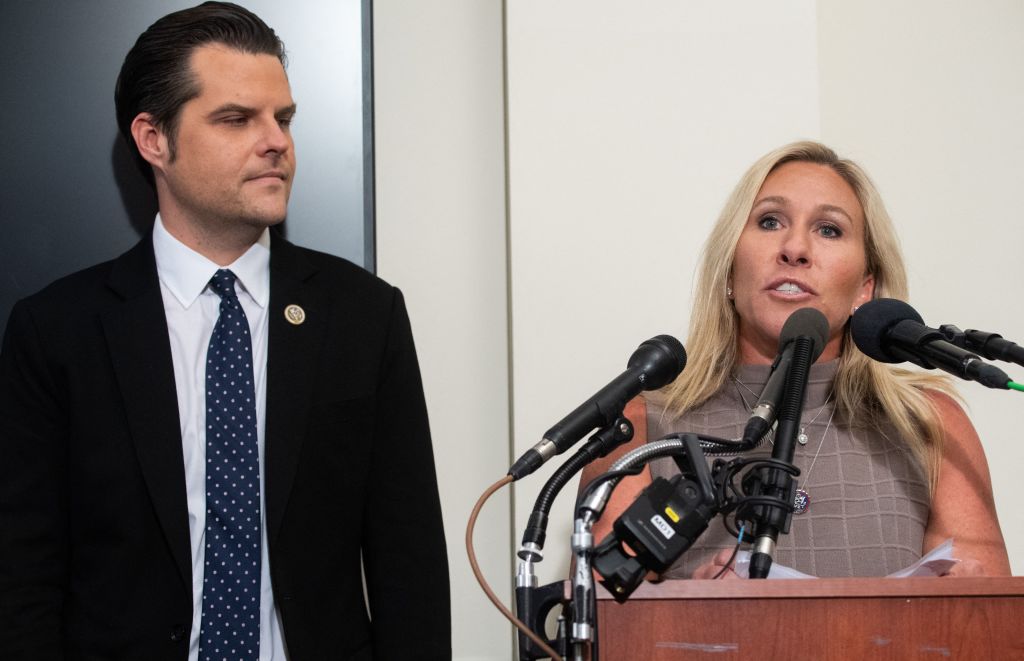Actual Malice

Constitutional government demands a free but responsible media.
The following essay is an excerpt from a longer item published as part of the Provocations series by the Center for the American Way of Life.
America’s corporate press is out of control. It claims to be an institution essential to successful self-government—and it would in fact be so, if it did its job responsibly. But all too often the American press seeks not to facilitate democratic deliberation by informing the voters but instead to shape political outcomes by dealing in hysteria and misinformation. More specifically, the corporate media routinely seeks to pull the nation’s politics leftward by using defamation to render prominent figures on the right odious to the public.
The case of Florida Congressman Matt Gaetz is only the most recent example. For much of the last two years, Gaetz has been the target of “news” stories, based on anonymous sources, that he was under investigation by the Department of Justice for sex trafficking. Now, we are told, career prosecutors are recommending against charges because of concerns about the credibility of the witnesses. This is another version of the same treatment given to Donald Trump before and during his presidency. For years Trump was subjected to innumerable breathless stories that he had “colluded” with Russia to steal the presidency. But when the investigation was over it turned out that Trump was guilty of no such thing.
These stories did not pan out, in the sense that they never led to legal charges, much less convictions. But they succeeded in what was no doubt their primary purpose. They were used to harass important figures on the American right, to hinder their political careers, and to prevent them, as much as possible, from engaging with voters on important issues.
As I argue in a new Provocations essay published by the Claremont Institute’s Washington Center for the American Way of Life, our press and our politics need not be this corrupt. Our present media culture of character assassination is not the necessary result of a free press. It is instead the result of a licentious press, which is in turn the creation of a licentious Supreme Court.
In the English and American legal tradition, the time-honored remedy for false and defamatory publication is the libel suit. For most of our history, the real possibility that victims of defamation—including politicians—might sue for damages and succeed imposed a salutary check on the press. Simple prudence then required reporters and editors to make sure that allegations were true before publishing them. That wholesome discipline tended both to protect the reputations of individual Americans and, at the same time, to support the truthfulness of the nation’s political discourse.
This changed, however, in 1964, when the Supreme Court issued its opinion in New York Times v. Sullivan—a decision that revised American libel law and ushered in our present era of press licentiousness. Writing for his colleagues, Justice William Brennan used the Court’s ruling in the New York Times case to impose a novel First Amendment doctrine on the country. The original and traditional understanding of the First Amendment had held that libel was unprotected by the Constitution, that it was outside the scope of the “freedom of the press” enshrined in the First Amendment. The New York Times Court departed from that older understanding by holding that, henceforward, “public officials” would be held to a different standard than ordinary citizens when they sued for libel. Subsequent rulings expanded the new requirements to the more expansive category of “public figures.” The result: under the now prevailing standards, public figures must demonstrate “actual malice” in order to sue successfully for libel. That is, they must show not only that they have been defamed by false publication, but also that the publisher acted with knowledge that the published material was false, or at least acted with reckless disregard for its truth or falsity.
The ruling resulted in a kind of revolution in American libel law. Prior to it, public figures could and did sue successfully for damages when they had been the victims of false, defamatory reporting. Today, thanks to the actual malice standard, it is practically impossible to do so—even when the press has admittedly publicized falsehood. Thus, most recently, Sarah Palin’s lawsuit against the New York Times failed, even though the Times conceded that it had erred in its claims about Palin, because the court held that Palin could not demonstrate “actual malice” on the part of the Times.
Contrary to Justice Brennan’s claims, the “actual malice” standard is not required by the First Amendment. The Founding generation did not understand the “freedom of the press” to include a license to libel. They held that libel was wrong, was outside the scope of the freedom of the press, and gave no thought to special standards, applied selectively to different classes of citizens, that would permit the press to get away with libel in some cases.
By imposing the “actual malice” standard, the New York Times Court not only erred in its interpretation of the First Amendment. It did serious damage to our nation’s political way of life, by undermining several key goals of our form of government. Americans are rightly taught that the core function of their government is to secure the rights of the people. But the New York Times doctrine actually erodes protection for a valuable right—the right to one’s reputation. Our country is also premised on the idea of equality. The New York Times doctrine, however, creates inequality among various classes of Americans—most obviously between ordinary citizens and public figures, whose right to reputation is less protected. Finally, America was founded to be a self-governing nation. But self-government is made into a charade when a pervasive culture of press dishonesty prevents the people from making rational and informed judgments about those contending for public office.
The Supreme Court helped to create these problems, and the Supreme Court can do a good deal to correct them. There are signs that some justices, such as Clarence Thomas and Neil Gorsuch, are interested in doing so. Their colleagues should join with them and reverse New York Times v. Sullivan at the earliest suitable opportunity.
The American Mind presents a range of perspectives. Views are writers’ own and do not necessarily represent those of The Claremont Institute.
The American Mind is a publication of the Claremont Institute, a non-profit 501(c)(3) organization, dedicated to restoring the principles of the American Founding to their rightful, preeminent authority in our national life. Interested in supporting our work? Gifts to the Claremont Institute are tax-deductible.
We've honored a slave-trading tyrant for far too long.



